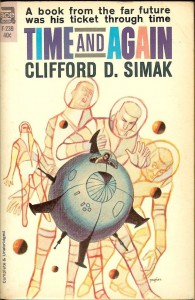Plot to burn but with hollow characters

I've been a fan of science fiction for as long as I can remember. Some of the first books I read were science fiction novels, and I've never stopped reading them. It wasn't until recently, though, that I began breaking out of my comfort zone in science fiction and reading novels that I might not normally have picked up. It's proven a real education in the genre, and one that helps me to appreciate how much it has changed.
Reading Clifford Simak's Time and Again has highlighted one of the most dramatic differences that exist between science fiction novels today and those of the genre's "golden age," which is the centrality of plot. Simak's novel has plot to burn. Set in the 80th century, it imagines a future in which mankind (and given the near-total absence of women from the book that really is the best word for it) dominates the stars. Yet the vastness of the galaxy means that their presence is thin, necessarily supplemented by both robots and "androids," or synthetic humans. Asher Sutton, a government agent dispatched to one of the few systems unpenetrated by humans, suddenly reappears after having been lost for twenty years. Only this improbable circumstance is met with one of his own, as his boss is alerted to his arrival by a time traveler with urgent advice: that Asher Sutton must be killed.
All of this, which might take up several chapters of a novel today, is presented to the reader in the first four pages. And Simak doesn't let up, as the reader is presented with a series of mysterious individuals, unexpected events, and hidden agendas that would nowadays populate a career-defining series for some authors, yet Simak wraps up in a little more than 250 pages. The sheer force of developments is enough to entertain the reader as they are propelled through each successive twist and turn. Such is the pace, though, that something gets lost in the rush -- namely, character development. Every single one of the characters comes across as a faceless agent for some greater power in the book, with that power ultimately boiling down to Simak himself. Even his central character, Asher Sutton, seems driven more by an impulse imprinted onto him rather than something that was explicable by who he was or any change as a result of his experiences over the course of the book. It makes for a contrast with how so much SF is written today, yet the narrative force often leaves little time to contemplate the emptiness of the characters involved. For some today it may be a criticism, yet it seems not to have bothered Simak a jot in providing an entertaining and even thought-provoking adventure for his readers.






